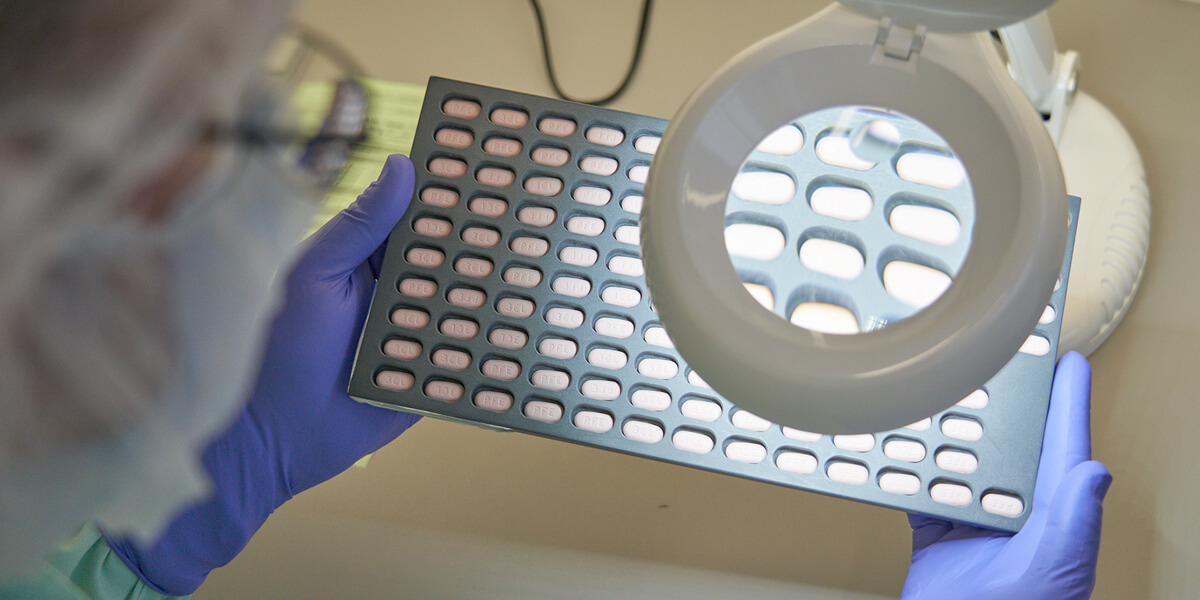Heroes of Pfizer Manufacturing & Supply
Heroes of Pfizer’s Manufacturing and Distribution: Development and Shipment of PAXLOVID
When Claire Moylan’s boss asked her if she wanted to help launch PAXLOVID™ (nirmatrelvir tablets; ritonavir tablets) in collaboration with the New Products site team, she was all in.

“We knew it was coming down the pipeline, that it had been developed at lightspeed to help address a global health crisis,” says Claire, who has led multiple commercial scale-ups as a site product portfolio lead at Pfizer’s Ringaskiddy site in Cork, Ireland.
She signed on to lead a team that aimed to produce 40 metric tons of active pharmaceutical ingredient, or API, for PAXLOVID – 10 times the maximum output of her previous projects – in just one year.
PAXLOVID has not been approved but has been authorized for emergency use by FDA under an EUA for the treatment of mild-to-moderate COVID-19 in adults and pediatric patients (12 years of age and older weighing at least 40 kg) with positive results of direct SARS-CoV-2 viral testing, and who are at high risk for progression to severe COVID-19, including hospitalization or death.
The emergency use of PAXLOVID is only authorized for the duration of the declaration that circumstances exist justifying the authorization of the emergency use of drugs and biological products during the COVID-19 pandemic under Section 564(b)(1) of the Act, 21 U.S.C. § 360bbb-3(b)(1), unless the declaration is terminated or authorization revoked sooner.
“I was hugely excited to be involved but also slightly apprehensive at first. Then, when I thought about all the work I had done previously, I knew I was ready for the challenge.”
Claire Moylan
Site Product Portfolio Lead

Facing that challenge with her would be her team at Ringaskiddy, who support each other as they manufacture crucial medicines day in and day out. But the biggest reason for Claire to take the new role? It was personal.
For most of 2020, she did not leave Cork to visit her family for fear she would carry the virus to them, especially her father, who was particularly vulnerable to COVID-19.
“When I learned how critical this medicine was, that really hit home,” Claire says. With the release of the COVID-19 vaccine and with PAXLOVID on the way, Claire felt comfortable enough to return home a few times and spend time with her father before he passed away. If Pfizer could help other people reconnect with their families after spending so much time apart in this unpredictable new world, she knew she had to be a part of it.
The Extra Mile
When a shipment of PAXLOVID arrived at Pfizer’s Memphis Logistics Center (MLC) in Tennessee, it was late on a Saturday, and Angel Perez was getting ready to head home.
“We volunteered to stay and take care of it – to store it, stage it, and make sure it was ready to ship out whenever it was needed,” says Angel, a group leader of distribution at MLC.
Having lost his wife to cancer, Angel is deeply aware of the role he and his colleagues have in the lives of others. Whether it’s PAXLOVID, cancer treatments, or medicines for other diseases, Angel and his colleagues are always ready to go above and beyond.
“We know what it means to rely on medicines coming on time because we’ve been there. We understand that if we don’t get these shipments out, it can mean life or death. That makes us go the extra mile.”
Angel Perez
Group Leader Distribution Center Operations

A New Way of Working
Racing against the clock required Pfizer to change its day-to-day operations. Processes were streamlined and siloes deconstructed. Whoever was needed to help make a decision was present at the meeting, whether they’re an operator on the manufacturing plant floor or senior executive. Everyone pulled together to get PAXLOVID out as quickly as possible.
“We set out needing to have two batches going through every single step of the process every week. We weren’t sure if we were going to achieve that,” Claire says. “But we banked on the integrated manufacturing excellence (IMEx) systems and processes that we have built into Pfizer’s global supply organization and our continuous improvement culture. I am so proud of the long hours and hard work the teams have put in, and now, we are in a position to exceed that goal.”

Pfizer People
Before joining Pfizer, Claire completed a PhD in medicinal organic chemistry. She was drawn to the pharmaceutical industry because of the potential to bring scientific breakthroughs to real patients.
“In Ireland, there are so many pharmaceutical companies, but I chose Pfizer because of the people. People I’d done my PhD with had gone there and spoke of this camaraderie, this bond and togetherness they all had in their day-to-day work.”
Angel began his 30-year journey with Pfizer at a warehouse in Barceloneta, Puerto Rico, where he gradually climbed the ranks, working as a coordinator and instructor for manufacturing staff, among other roles. When Pfizer announced the closing of that site, Angel’s friend encouraged him to apply for a job at MLC. Now, he works with all the cold-chain products that come through the site.
Making a difference in people’s lives is important to both Claire and Angel, and they are gratified to work every day alongside a supportive group of similarly motivated people.
“When my wife passed away, they gave me as much time as I needed to grieve, and a lot of my coworkers were by my side.”
Angel Perez
Group Leader Distribution Center Operations
He didn’t see them as friends but rather as Pfizer people, a group that doesn’t just work together but takes care of each other.
The support ranges from the personal to the professional. In academia, Claire was used to working alone much of the time. At Pfizer, she found a welcoming team that believes in her even when she may doubt herself.
“The responsibility they’ve given me and the faith they’ve put in me has been huge. The relationships I’ve built on site, as well as the development opportunities I’ve been given, have made me a completely different person than I was six years ago when I joined Pfizer,” Claire says.
For those unsure if Pfizer is the right place for them, Claire and Angel advocate making the leap. People don’t need to arrive at Pfizer with all the answers and knowing how to do everything right away. What’s important is the desire to work and make a difference for others. Pfizer and its people will take care of the rest.
Important Safety Information
PAXLOVID is contraindicated in patients with a history of clinically significant hypersensitivity reactions (eg, toxic epidermal necrolysis [TEN] or Stevens-Johnson syndrome) to its active ingredients (nirmatrelvir or ritonavir) or any other components of the product.
PAXLOVID is contraindicated with drugs that are highly dependent on CYP3A for clearance and for which elevated concentrations are associated with serious and/or life-threatening reactions:
- Alpha 1-adrenoreceptor antagonist: alfuzosin
- Analgesics: pethidine, propoxyphene
- Antianginal: ranolazine
- Antiarrhythmic: amiodarone, dronedarone, flecainide, propafenone, quinidine
- Anti-gout: colchicine
- Antipsychotics: lurasidone, pimozide, clozapine
- Ergot derivatives: dihydroergotamine, ergotamine, methylergonovine
- HMG-CoA reductase inhibitors: lovastatin, simvastatin
- PDE5 inhibitor: sildenafil (Revatio ®) when used for pulmonary arterial hypertension
- Sedative/hypnotics: triazolam, oral midazolam
PAXLOVID is contraindicated with drugs that are potent CYP3A inducers where significantly reduced nirmatrelvir or ritonavir plasma concentrations may be associated with the potential for loss of virologic response and possible resistance. PAXLOVID cannot be started immediately after discontinuation of any of the following medications due to the delayed offset of the recently discontinued CYP3A inducer:
- Anticancer drugs: apalutamide
- Anticonvulsant: carbamazepine, phenobarbital, phenytoin
- Antimycobacterials: rifampin
- Herbal Products: St. John’s Wort (hypericum perforatum)
There are limited clinical data available for PAXLOVID. Serious and unexpected adverse events may occur that have not been previously reported with PAXLOVID use.
Risk of Serious Adverse Reactions Due to Drug Interactions: Initiation of PAXLOVID, a CYP3A inhibitor, in patients receiving medications metabolized by CYP3A or initiation of medications metabolized by CYP3A in patients already receiving PAXLOVID, may increase plasma concentrations of medications metabolized by CYP3A. Initiation of medications that inhibit or induce CYP3A may increase or decrease concentrations of PAXLOVID, respectively. These interactions may lead to:
- Clinically significant adverse reactions, potentially leading to severe, life-threatening, or fatal events from greater exposures of concomitant medications
- Clinically significant adverse reactions from greater exposures of PAXLOVID
- Loss of therapeutic effect of PAXLOVID and possible development of viral resistance
Consult Table 1 of the Fact Sheet for Healthcare Providers for clinically significant drug interactions, including contraindicated drugs. Consider the potential for drug interactions prior to and during PAXLOVID therapy; review concomitant medications during PAXLOVID therapy and monitor for the adverse reactions associated with the concomitant medications.
Hypersensitivity reactions have been reported with PAXLOVID including urticaria, angioedema, dyspnea, mild skin eruptions, and pruritus. Cases of anaphylaxis, TEN, and Stevens-Johnson syndrome have also been reported with components of PAXLOVID (refer to NORVIR labeling). If signs and symptoms of a clinically significant hypersensitivity reaction or anaphylaxis occur, immediately discontinue PAXLOVID and initiate appropriate medications and/or supportive care.
Hepatotoxicity: Hepatic transaminase elevations, clinical hepatitis, and jaundice have occurred in patients receiving ritonavir. Therefore, caution should be exercised when administering PAXLOVID to patients with pre-existing liver diseases, liver enzyme abnormalities, or hepatitis.
Because nirmatrelvir is co-administered with ritonavir, there may be a risk of HIV-1 developing resistance to HIV protease inhibitors in individuals with uncontrolled or undiagnosed HIV-1 infection.
Adverse events in the PAXLOVID group (≥1%) that occurred at a greater frequency (≥5 subject difference) than in the placebo group were dysgeusia (6% and <1%, respectively), diarrhea (3% and 2%), hypertension (1% and <1%), and myalgia (1% and <1%). The proportions of subjects who discontinued treatment due to an adverse event were 2% in the PAXLOVID group and 4% in the placebo group.
The following adverse reactions have been identified during post-authorization use of PAXLOVID. Because these reactions are reported voluntarily from a population of uncertain size, it is not always possible to reliably estimate their frequency or establish a causal relationship to drug exposure.
Immune System Disorders: Hypersensitivity reactions
Required Reporting for Serious Adverse Events and Medication Errors: The prescribing healthcare provider and/or the provider’s designee is/are responsible for mandatory reporting of all serious adverse events and medication errors potentially related to PAXLOVID within 7 calendar days from the healthcare provider’s awareness of the event.
Submit adverse event and medication error reports to FDA MedWatch using one of the following methods:
- Online: https://www.fda.gov/medwatch/report.htm
- Complete and submit a postage-paid FDA Form 3500and returning by mail/fax
- Call 1-800-FDA-1088 to request a reporting form
In addition, please provide a copy of all FDA MedWatch forms to: www.pfizersafetyreporting.com, or by fax (1-866-635-8337) or phone (1-800-438-1985).
PAXLOVID is an inhibitor of CYP3A and may increase plasma concentrations of drugs that are primarily metabolized by CYP3A. Co-administration of PAXLOVID with drugs highly dependent on CYP3A for clearance and for which elevated plasma concentrations are associated with serious and/or life-threatening events is contraindicated. Co-administration with other CYP3A substrates may require a dose adjustment or additional monitoring.
Nirmatrelvir and ritonavir are CYP3A substrates; therefore, drugs that induce CYP3A may decrease nirmatrelvir and ritonavir plasma concentrations and reduce PAXLOVID therapeutic effect.
Pregnancy: There are no available human data on the use of nirmatrelvir during pregnancy to evaluate for a drug-associated risk of major birth defects, miscarriage, or adverse maternal or fetal outcomes. Published observational studies on ritonavir use in pregnant women have not identified an increase in the risk of major birth defects. Published studies with ritonavir are insufficient to identify a drug-associated risk of miscarriage. There are maternal and fetal risks associated with untreated COVID-19 in pregnancy.
Lactation: There are no available data on the presence of nirmatrelvir in human or animal milk, the effects on the breastfed infant, or the effects on milk production. A transient decrease in body weight was observed in the nursing offspring of rats administered nirmatrelvir. Limited published data reports that ritonavir is present in human milk. There is no information on the effects of ritonavir on the breastfed infant or the effects of the drug on milk production. The developmental and health benefits of breastfeeding should be considered along with the mother's clinical need for PAXLOVID and any potential adverse effects on the breastfed infant from PAXLOVID or from the underlying maternal condition. Breastfeeding individuals with COVID-19 should follow practices according to clinical guidelines to avoid exposing the infant to COVID-19.
Contraception: Use of ritonavir may reduce the efficacy of combined hormonal contraceptives. Advise patients using combined hormonal contraceptives to use an effective alternative contraceptive method or an additional barrier method of contraception.
Pediatrics: PAXLOVID is not authorized for use in pediatric patients younger than 12 years of age or weighing less than 40 kg. The safety and effectiveness of PAXLOVID have not been established in pediatric patients. The authorized adult dosing regimen is expected to result in comparable serum exposures of nirmatrelvir and ritonavir in patients 12 years of age and older and weighing at least 40 kg as observed in adults, and adults with similar body weight were included in the trial EPIC-HR.
Systemic exposure of nirmatrelvir increases in renally impaired patients with increase in the severity of renal impairment. No dosage adjustment is needed in patients with mild renal impairment. In patients with moderate renal impairment (eGFR ≥30 to <60 mL/min), reduce the dose of PAXLOVID to 150 mg nirmatrelvir and 100 mg ritonavir twice daily for 5 days. Prescriptions should specify the numeric dose of each active ingredient within PAXLOVID. Providers should counsel patients about renal dosing instructions. PAXLOVID is not recommended in patients with severe renal impairment (eGFR <30 mL/min based on CKD-EPI formula) until more data are available; the appropriate dosage for patients with severe renal impairment has not been determined.
No dosage adjustment of PAXLOVID is needed for patients with either mild (Child-Pugh Class A) or moderate (Child-Pugh Class B) hepatic impairment. No pharmacokinetic or safety data are available regarding the use of nirmatrelvir or ritonavir in subjects with severe hepatic impairment (Child-Pugh Class C); therefore, PAXLOVID is not recommended for use in patients with severe hepatic impairment.
